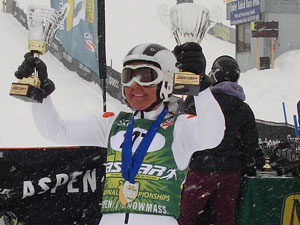
Carol Grant Sullivan accepts the winner's cup for her 1st place finish in all five Giant Slalom races at the NASTAR National Finals in Snowmass, Colorado. (Photo: Courtesy of Carol Grant)
April is Parkinson's Awareness Month
It was a dream of Carol Grant Sullivan's to ski race again.
And on March 24, 2013, Carol not only made her dream to race come true, but also stood on the podium as champion.
The 55-year-old Canadian had won all five giant slalom races at a U.S. national ski competition.
Making the moment even more incredible, American Olympic skier Julia Mancuso awarded Carol the winning cup for her 1st place finish– and told Carol she was her hero.
"I just stood on the podium and soaked it in," said Carol. "I really stopped to just enjoy that moment. It was something I will never forget."
It was also a moment few may never have expected. Carol had been diagnosed with moderate Parkinson's disease in 2008.
Life-changing accident
Despite being partially sighted, Carol had been an avid skier her whole life. She had tried all types of the sport, from off-piste to extreme skiing. Her talent in the latter led her to ski the highest peaks in three continents.
But a terrible crash while skiing the Andes Mountains in 2004 changed her life forever.
Following the accident, Carol's body wouldn't stop shaking and she had no idea why.
"It was a really difficult time, I couldn't figure out what was wrong," she said. "Without understanding what was happening to me, it felt like I was going crazy."
Over the next four years, neurologists were unable to properly diagnose the problem. Some believed her tremors were due to her ski accident. Others thought she had developed a condition known as Essential Tremor.
Diagnosis revealed
It was only when she was referred to Dr. Anthony Lang and his team at the Movement Disorders Clinic at the Krembil Neuroscience Centre that she received a proper diagnosis.
Carol had Parkinson's disease– a neurological movement disorder that is chronic and progressive, meaning that symptoms continue and worsen over time.
There is no cure for the disease although it can be treated to a certain extent with medication and, in some cases, surgery.
"Initially, I was shocked at the diagnosis, it was devastating," Carol said. "I definitely took a step away from my life, there was a pause. I wondered, 'Is this it? Am I a goner?' I really didn't know what to expect of my future."
Living with Parkinson's
By the time Carol was officially diagnosed with Parkinson's, her condition had worsened.
The disease focused its efforts on the right side of her body. She had uncontrollable tremors and was unable to walk properly.
Her arms swung out of synch and her handwriting had become illegible.
In the year following her diagnosis, adapting to the disease was a struggle. Carol's shoulders and neck were so sore she was unable to sit comfortably. Returning to her corporate job was impossible and she had to seek out a new career.
Still, even against these obstacles, Carol focused on staying positive.
"With every hurdle, failure, adversity or heartbreak in life, there is the seed of something greater," she said. "Parkinson's has been a heartbreaker for sure, but this adversity has helped me make something bigger of myself."
"When you challenge yourself, new doors open. I just had to remind myself that I could do more than I thought I could. I don't think there's a person anywhere who isn't capable of doing more than he thinks he can," she continued.
Moving forward
Having grown up in Northern Ontario, she was familiar with the fur industry, so launched the successful luxury fur business, Caroline Furs.
Meanwhile, although it took time to find the right medication to control Carol's Parkinson's, slowly, over time, her symptoms began to improve. When they did, she was able to get back on the ski hill. A few years ago, Carol began spending winters in Aspen, Colorado so she could ski every day.
Carol discovered the combination of sun, fresh air, high altitude and the focus of skiing helped her cope with her condition.
"Skiing daily again showed me how important it is to get back to what you love," she said. "Find that one thing that makes you happy and do it because it will pay dividends in terms of your ability to cope with Parkinson's disease."
From skiing to racing
In 2011, a lack of snow in Aspen led Carol to try the race course. As soon as she did— she was hooked. That's when she set her sights on the NASTAR National Championships.
Carol trained daily to improve her upper body strength, while Dr. Lang and his team continued to provide medical advice and treatment to ensure she could take on the challenge.
"Dr. Lang and his team gave me the strength and confidence I needed to pursue my dream," she said. "Dr. Lang is brilliant in both the science related to my care but also helping me to psychologically deal with having Parkinson's. Without the medication prescribed and support of the Movement Disorders Clinic, I'm not sure where I would be today."
The newly crowned champion says she certainly couldn't have raced – let alone reached the podium—without all of their support.
And thanks to the added help from her husband and kids, Carol has no plans to slow down.
"Most people with Parkinson's don't realize what they are capable of," she said. "My advice is to aim high. You'll be surprised at what goals and dreams you can achieve."
What next?
While Carol continues to ski and train, she's also raising money to help patients like her reach their dreams.
On September 18, she will chair the 2nd annual FACES Luncheon, which supports Dr. Lang's clinic and other Parkinson's patients. To donate, click here
